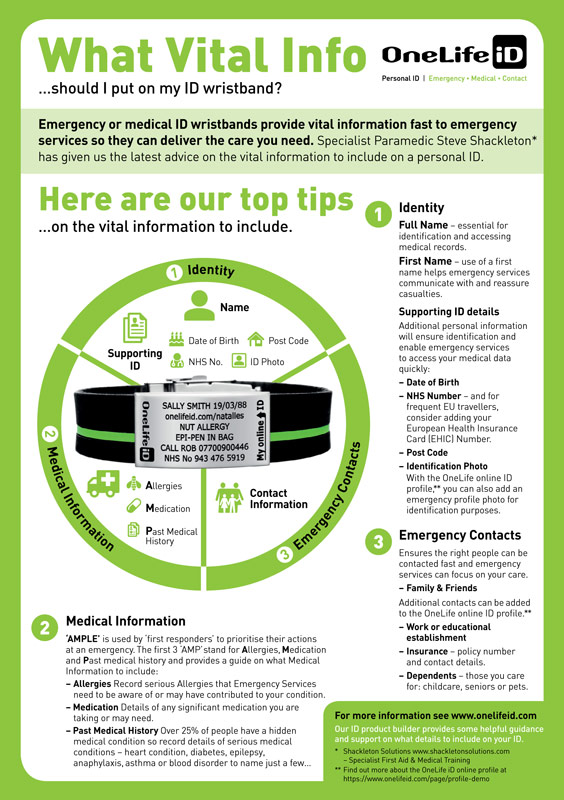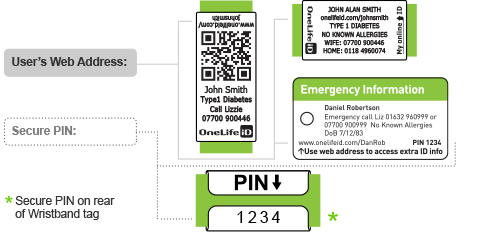Top Tips Information to include on emergency or medical ID bands

We can all appreciate the benefits of leading an active lifestyle whether it is walking the dog, riding or even adventure sports.
Before venturing out it makes sense to prepare well and ensure you have the right kit. At OneLife iD we believe this includes carrying or wearing an up to date form of identification which will quickly provide vital information to emergency services so they can deliver the care you need.
At OneLife iD we are often asked, “What vital information should be included on my emergency or medical ID wristband or tag? We asked Specialist Paramedic Steve Shackleton for the latest advice on what vital information to include on a emergency ID wristband or Medical ID bracelet. He focussed on 3 main areas:
- Identity
- Medical information
- Emergency contacts
The following guidelines highlight the range of information emergency services need and will enable you to select the details you need to record on your ID.
Download our Quick Guide here.
1 - Identity
Name - Your Full Name is essential for identification and accessing medical records.
Emergency services use a first name to communicate and reassure casualties. Hearing tends to be the last sense that people lose when consciousness is impaired so using a first name really helps getting a casualty to respond.
On a Child’s ID you may wish to assess the pros and cons of providing their name.
Additional personal information:
Date of Birth, NHS Number or Post Code can all be used by modern electronic care systems to enable emergency services to access your medical data quickly. For frequent EU travellers consider adding your European Health Insurance Card (EHIC) number.
Identification Photo - The OneLife online ID profile allows you to add an up to date photo. This is one of the best mechanisms for confirming correct identification and helps ensure that accurate information is communicated to the right people. For more information on the OneLife iD online profile click here.
2 - Medical Information
‘AMPLE’ is used by ‘first responders’ at the scene of an incident to prioritise their actions. The first three letters ‘AMP’ for Allergies, Medication and Past medical history. The AMP details help emergency services assess whether your Allergies, Medication or Past Medical History may be a contributing factor in your condition and enable emergency services to provide prompt and effective treatment.
Allergies - Paramedics want to be aware of any allergies you may have that may be the reason for the ‘presenting condition’ or to ensure that whatever support they provide does not make you worse.
Medication - Details of any significant medication you are taking or may need.>
Past Medical History – Over 25% of people have a hidden medical condition that may not be immediately obvious such as dementia, heart condition, diabetes, anaphylaxis, epilepsy, asthma, severe allergy or blood disorder to name just a few.
Details of your medical history are critical in enabling the provision of correct treatment. An ID should highlight relevant medical history to ensure prompt and effective care.
If you know your blood group you can include it but it is not necessary as this is included in your medical record or is routinely checked before treatment is given.
3 – Contact information for emergency contacts
Contact Information helps support quick communication with your emergency contacts and enables emergency services or those with you to focus on your care.
As well as close family and friends you may also use the online profile to add extra emergency contact information:
· Dependants – details and arrangements for those you care for including children, seniors or pets.
· Insurance – For frequent overseas travellers insurance details including policy number and contacts may be useful.
OneLife Online ID profile
With the OneLife online ID profile you can provide additional emergency contacts and more detailed information and attachments. Whenever you update your emergency contact numbers or medical information the ‘Last Reviewed Date’ is automatically updated. For more information on the OneLife iD online profile go here.
Summary
When it comes to personal identification everyone has different needs but we hope that the guidance is useful in helping you to understand what emergency services need:
- Identity
- Medical information – allergies, medication and past medical history
- Emergency contacts
So with this guidance you can assess what information you need to include on your ID and which of our ID products (ID wristband, sports ID, medical alert bracelet, ID card, ID tag) best suits your needs.
Find more information, support and to view our product range - click here.
Specialist Paramedic Steve Shackleton runs Shackleton Solutions – provider of Specialist First Aid & Medical Training

